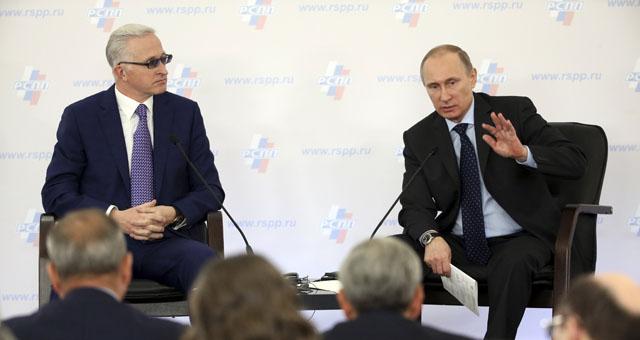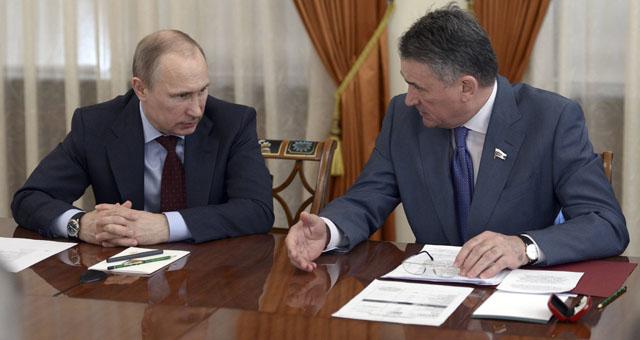You are here
Putin tells Russian businessmen to bring their assets back home
By Reuters - Mar 20,2014 - Last updated at Mar 20,2014

MOSCOW — President Vladimir Putin told company bosses on Thursday to bring their assets home and clean up their businesses to help Russia survive Western sanctions over Crimea, and an economic downturn.
Facing a possible widening of Western sanctions that may target businessmen close to Putin, some of Russia’s oligarchs are increasingly nervous about their companies’ prospects.
Some of Russia’s largest companies are registered abroad where they may benefit from lower tax rates but also may enjoy some distance from the Kremlin and feel beyond its reach.
Without referring to Russia’s annexation of Ukraine’s Crimea region or to slowing economic growth, Putin said it would also be in the bosses’ interests to support the Russian economy.
“Russian companies should be registered on the territory of our nation, in our country and have a transparent ownership structure,” Putin told heads of Russia’s largest companies.
“I am certain that this is also in your interests,” he said, pressing home a patriotic message at a conference full of businessmen, including a front row of top oligarchs such as media mogul Alisher Usmanov and metals magnate Vladimir Potanin.
Putin waged war on the oligarchs who amassed political influence as well as vast riches under former president Boris Yeltsin, driving some out of Russia and forcing those who remained to stay out of politics.
Since then, several businessmen with ties to Putin have come to dominate the corporate landscape and are now among Russia’s richest men.
His words may have made some oligarchs nervous. Usmanov’s Internet holding group Mail.Ru is registered in the British Virgin Islands, while X5 Retail Group, owned by Mikhail Fridman, who was not at the conference, is registered in Amsterdam.
Returning to the Kremlin in May 2012 for a third presidential term, Putin has urged politicians and businessmen to return from the “offshore shadows” and stop spiriting cash out of the country, a move some critics say was a move by a weakened president to ensure loyalty among Russia’s elite.
But with sanctions imposed by the United States and European Union (EU) on officials, his demands are carrying more weight, ensuring there will be little public sympathy for oligarchs who may be stung by widening punitive measures.
“Our task is not only to limit the possibilities of offshore schemes,” Putin said. “We understand perfectly well that little can be achieved through prohibitions. The main direction of our work is in something else: it is necessary to increase the attractiveness of the Russian jurisdiction, improve the business climate, and strengthen legal guarantees and the protection of property.”
Fear of sanctions to come
The conference, days after Putin signed a treaty on bringing Ukraine’s Crimea region into Russia, was surprisingly upbeat despite the threat of deeper sanctions by the United States and EU, Russia’s top trading partner.
Many Russians have been swept up in nationalist fervour since Moscow annexed Crimea. But bubbling under the surface, there were some doubts as to what lay ahead.
Putin’s moves in Ukraine have wiped $50 billion off Russia’s stock market this month, sent the rouble down 9 per cent since the beginning of the year and further weakened Russia’s poor investment climate.
The economy grew 0.7 per cent in January, a slowdown from 1 per cent the previous month and analysts expect it to slow further as the impact of the crisis in Ukraine is felt.
“The integration of the global economy has reached such an extent that any split in economic ties cannot happen without consequences,” said Usmanov, a close ally of the Kremlin. “Therefore we do not need sanctions.”
Potanin, who owns a stake in the world’s largest nickel and palladium producer Norilsk Nickel, noted that he had worked out a contingency plan, just in case.
“Sanctions are a double-edged sword, it’s not clear who will be more hurt,” he said.
Most business owners know that this time the government will not prop them up, as it did during the 2008/2009 global financial crisis when Russia burnt through billions of dollars from its reserves to support its largest companies.
“We will watch how the situation develops, in what direction both our economy and the situation in the financial sector go,” Finance Minister Anton Siluanov told the same conference.
Siluanov said the government would, if necessary, support Russia’s most important companies and institutions, but it did not have the resources to offer help to the majority of companies.
“We do not want to be helping company owners all the time,” he remarked.
Putin was clear that Russia’s economy would develop on its own terms, and would do his best to reward loyal companies.
He said Russia should find ways to help Russian companies win contracts with state companies while holding competitive auctions with foreign companies to please what he called the more liberal economists in this room.
And while he knew business would like more flexibility in reducing the workforce, he would always consider the “social aspects” of these “difficult problems” — a clear reference to Russia’s monocities which are dependent on certain industries.
“We will do this,” he said. “I hope you understand me correctly.”
Related Articles
US President Barack Obama announced sanctions on Thursday against prominent Russians including close allies of President Vladimir Putin, as Moscow raced to complete its annexation of Crimea and built up its forces in the region.
Lower oil prices and Western financial sanctions imposed over the Ukraine crisis will cost Russia around $130-140 billion a year — equivalent to around 7 per cent of its economy — Finance Minister Anton Siluanov said on Monday.
President Vladimir Putin said on Thursday that Russia would develop its own credit card system to reduce reliance on Western-based companies and soften the potential blow from US and European union (EU) sanctions.














